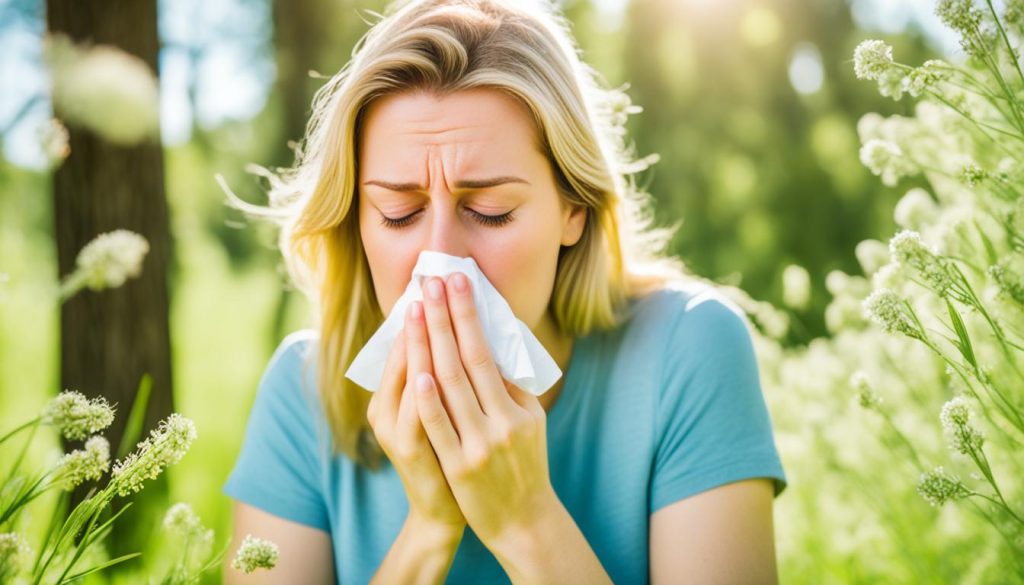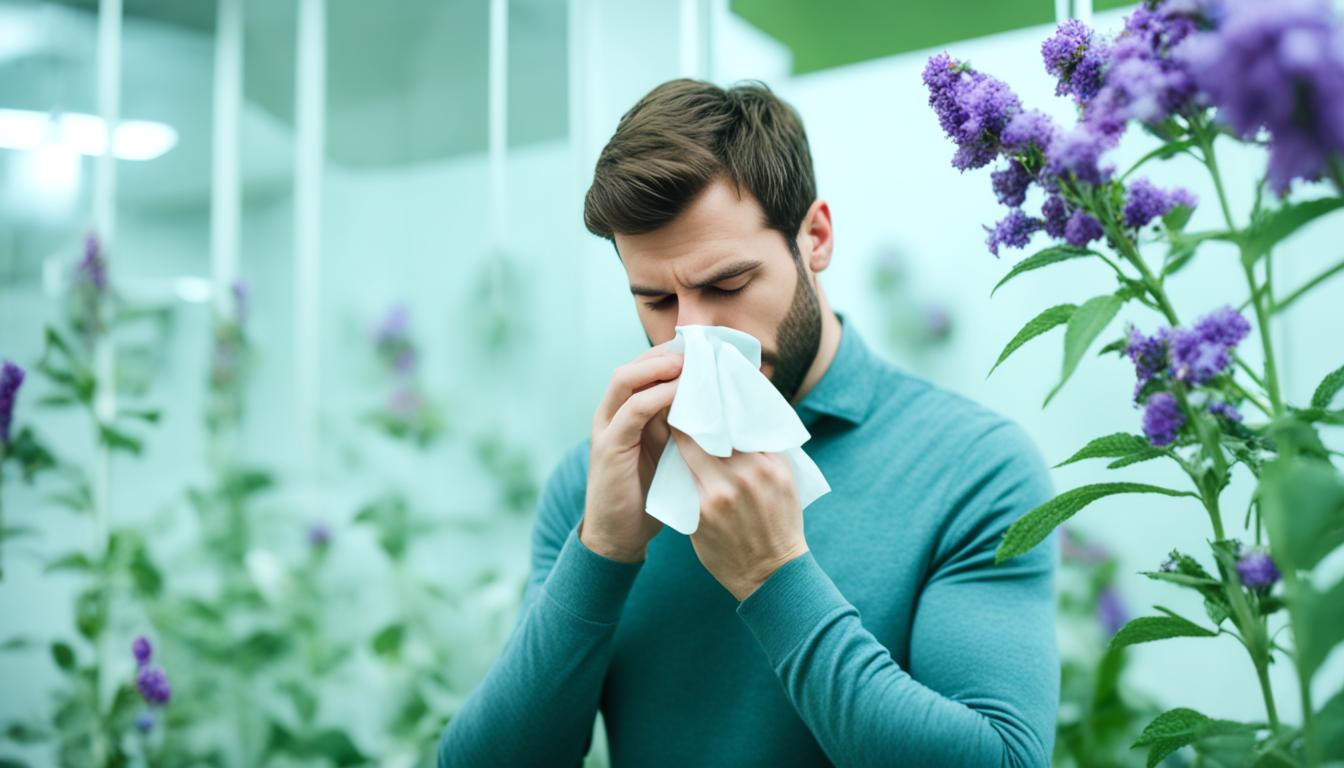Hay fever can be a debilitating condition, but there are ways to find fast relief. This article will provide you with effective strategies and treatments to stop hay fever symptoms immediately. From home remedies to medical treatments, we have you covered.
What Causes Hay Fever and its Symptoms?
Hay fever, also known as allergic rhinitis, is a common allergic reaction to pollen. It is triggered by allergens like tree, grass, and weed pollen. When a person with hay fever comes into contact with these allergens, their immune system overreacts and releases chemicals, such as histamine, which cause symptoms.
The symptoms of hay fever can vary from person to person, but the most common symptoms include:
- Sneezing
- Runny or stuffy nose
- Itchy or watery eyes
- Itchy throat or ears
- Coughing
- Fatigue
These symptoms can range from mild to severe and can significantly impact the quality of life for hay fever sufferers.
The Role of Pollen
Pollen is a fine powder produced by plants for the purpose of fertilization. It is carried by the wind or insects from one plant to another. In individuals with hay fever, their immune system mistakenly identifies pollen as a harmful substance and triggers an allergic reaction.
Understanding the Causes and Symptoms
Understanding the causes and symptoms of hay fever is essential in finding the right treatment. By identifying the specific allergens that trigger your symptoms, you can take steps to avoid or minimize your exposure to them.

Awareness of common triggers, such as high pollen counts during certain times of the year or specific types of pollen, can help you better manage your symptoms. Keeping track of your symptoms and potential triggers can provide valuable insights into your hay fever patterns.
How to Stop Hay Fever Immediately?
Home Remedies for Immediate Relief
When hay fever symptoms strike, finding immediate relief is crucial. While medical treatments may provide effective solutions, there are also several home remedies that can help alleviate discomfort and provide instant relief. These natural hay fever remedies are easily accessible and can be done in the comfort of your own home.
1. Petroleum Jelly as a Pollen Deterrent
Applying a thin layer of petroleum jelly around your nostrils can help prevent pollen from entering your nasal passages. This simple home remedy acts as a barrier, reducing the chances of triggering hay fever symptoms. Remember to wash your hands thoroughly before and after application to avoid any potential irritation.
2. Breathing in Steam
Inhaling steam can help soothe irritated nasal passages and relieve congestion. Fill a bowl with hot water and place a towel over your head to trap the steam. Breathe deeply for several minutes, allowing the steam to penetrate your airways. Adding a few drops of essential oils such as eucalyptus or peppermint can enhance the therapeutic effects.
3. Rinsing Nasal Passages with Saltwater
Nasal irrigation with a saltwater solution can effectively clear out allergens and mucus from your nasal passages, providing immediate relief from hay fever symptoms. You can use a neti pot or a saline nasal spray for this purpose. Follow the instructions carefully to ensure proper usage and avoid any discomfort.
4. Treating Itchy Eyes with a Cold Compress
Itchy and irritated eyes are common manifestations of hay fever. Applying a cold compress or chilled eye mask can help reduce inflammation and alleviate the itchiness. Simply place a clean cloth soaked in cold water over your closed eyes for a few minutes. Repeat as needed for instant relief.
5. Hydrating with Honey and Lemon
A warm beverage made with honey and lemon can provide relief from congestion and help soothe a sore throat. Mix a tablespoon of honey and the juice of half a lemon in a cup of hot water. Stir well and sip slowly. The antimicrobial properties of honey and the vitamin C in lemon can help alleviate hay fever symptoms and provide instant comfort.
These home remedies can be effective in providing immediate relief from hay fever symptoms such as sneezing, runny nose, itching, and congestion. Incorporating these natural hay fever remedies into your daily routine can offer comfort and ease during the hay fever season.
To enhance your understanding of the various home remedies for hay fever, refer to NHS website.

Medical Treatments for Fast Relief
If home remedies are not providing enough relief, there are medical treatments available for hay fever. These include over-the-counter antihistamine tablets, nasal sprays, and eye drops. In severe cases, a hay fever injection or immunotherapy may be recommended by a doctor.
Antihistamine Tablets
Antihistamine tablets are commonly used to treat hay fever symptoms. They work by blocking the effects of histamine, a chemical released by the body in response to allergens. This helps to alleviate symptoms such as sneezing, itching, and runny nose. Some popular antihistamine tablets available over-the-counter include:
| Brand Name | Active Ingredient |
|---|---|
| Clarityn | Loratadine |
| Piriton | Chlorphenamine |
| Zirtek | Cetirizine |
Nasal Sprays
Nasal sprays can help relieve nasal congestion and inflammation caused by hay fever. They work by reducing swelling in the nasal passages and can provide fast relief. Some commonly used nasal sprays for hay fever include:
- Beconase
- Rhinolast
- Flixonase
Eye Drops
Itchy and irritated eyes are a common symptom of hay fever. Eye drops can help alleviate these symptoms by reducing inflammation and soothing the eyes. Some popular hay fever eye drops include:
- Opticrom
- Murine Hayfever Relief
- Clarinaze
Hay Fever Injection or Immunotherapy
In severe cases of hay fever where symptoms are not adequately controlled by medication, a hay fever injection or immunotherapy may be recommended. This involves receiving regular injections containing small amounts of allergens to gradually desensitize the immune system. Over time, this can help reduce the severity of hay fever symptoms.

Consult with your doctor to determine the most suitable medical treatment for your hay fever symptoms. They will be able to assess your condition and provide personalized advice based on your needs and medical history.
Tips for Prevention and Long-Term Relief
While immediate relief is important, preventing hay fever symptoms and finding long-term relief is equally crucial. By implementing these strategies, you can minimize the impact of hay fever and enjoy a better quality of life.
1. Hay Fever Prevention
Preventing hay fever starts with avoiding exposure to allergens. Keep an eye on pollen counts, especially during hay fever season, and try to stay indoors during peak pollen times. Close windows and use air purifiers to filter out pollen. When going outside, wearing sunglasses can protect your eyes from pollen, and applying a barrier balm such as petroleum jelly around your nostrils can help prevent pollen from entering your nasal passages.
2. Managing Hay Fever Fatigue
Hay fever fatigue can significantly impact your energy levels and overall well-being. To manage fatigue, prioritize restful sleep by keeping your bedroom clean and allergen-free. Consider using hypoallergenic bedding and washing your sheets regularly. Additionally, managing stress levels, eating a healthy diet, and staying hydrated can help combat fatigue associated with hay fever.
3. Allergy Relief
In addition to preventing hay fever symptoms, finding relief from allergies is essential. Over-the-counter antihistamines can provide temporary relief by blocking the histamine response in your body. Nasal sprays and eye drops specifically designed for allergy relief can also help alleviate symptoms. However, it’s important to consult your doctor or pharmacist for appropriate medication options suitable for your specific needs.
4. Long-Term Treatment Options for Hay Fever
While there is no permanent cure for hay fever, there are long-term treatment options that can help manage symptoms effectively. Allergen immunotherapy, commonly known as allergy shots, involves gradually exposing your body to small amounts of allergens over time to build up tolerance. This can provide significant relief and reduce the severity of symptoms in the long run. Consult with an allergist to determine if this treatment is suitable for you.

Conclusion
Dealing with hay fever symptoms can be exhausting and disruptive, but there are effective measures that can provide both immediate relief and long-term management. By combining home remedies, medical treatments, and preventive strategies, individuals can find ways to alleviate hay fever fatigue and enjoy the changing seasons without constant discomfort.
Home remedies such as using petroleum jelly to deter pollen, breathing in steam, and rinsing nasal passages with saltwater can offer immediate relief. Additionally, treating itchy eyes with a cold compress and hydrating with honey and lemon can help ease congestion. These natural remedies can be incorporated into daily routines to alleviate hay fever symptoms.
For more severe hay fever symptoms, medical treatments like antihistamine tablets, nasal sprays, and eye drops can provide fast relief. In some cases, a hay fever injection or immunotherapy may be recommended by a healthcare professional for long-term management. Consultation with a doctor will ensure personalized advice and the best hayfever tablets or medications for your specific needs.
Prevention is key to managing hay fever. Understanding the hay fever season and avoiding exposure to allergens can significantly reduce symptoms. Wearing sunglasses, keeping windows closed during high pollen counts, and using air purifiers can further prevent hay fever attacks. Remember, working closely with a healthcare professional and following their guidance is essential in effectively managing hay fever and finding the most suitable treatment plan.

